Related Research Articles

The Mahābhārata is one of the two major Sanskrit epics of ancient India revered as Smriti texts in Hinduism, the other being the Rāmāyaṇa. It narrates the events and aftermath of the Kurukshetra War, a war of succession between two groups of princely cousins, the Kauravas and the Pāṇḍavas.
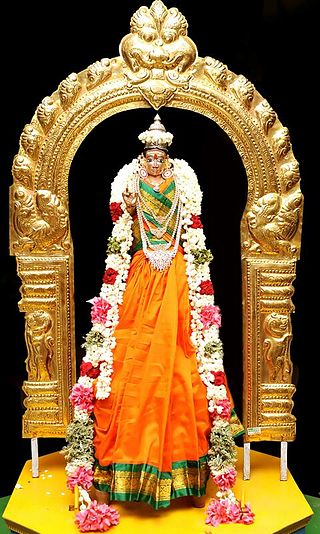
Draupadi, also referred to as Krishnā, Panchali, and Yajnaseni, is the main female protagonist of the ancient Indian epic Mahabharata, and the wife of the five Pandava brothers—Yudhishthira, Bhima, Arjuna, Nakula, and Sahadeva. She is noted for her beauty, courage, polyandrous marriage.
Biblical studies is the academic application of a set of diverse disciplines to the study of the Bible, with Bible referring to the books of the canonical Hebrew Bible in mainstream Jewish usage and the Christian Bible including the canonical Old Testament and New Testament, respectively. For its theory and methods, the field draws on disciplines ranging from ancient history, historical criticism, philology, theology, textual criticism, literary criticism, historical backgrounds, mythology, and comparative religion.
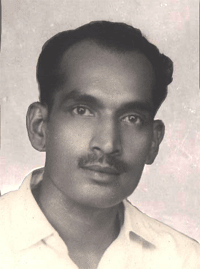
Panikkassery Keshavan "P.K." Balakrishnan was an Indian novelist and critic. A doyen of Malayalam literature, he is best known for his novel, Ini Njan Urangatte, a novel based on Mahabharata as well as a number of critical studies which include Chandu Menon Oru Padanam, Novel Siddhiyum Sadhanayum, Kavyakala Kumaranasaniloode, and Ezhuthachante Kala: Chila Vyasabharatha Patanangalum. His Jathivyavasthayum Kerala Charitravum is a work in social history.
The folklore of India encompasses the folklore of the Republic of India and the Indian subcontinent. India is an ethnically and religiously diverse country. Given this diversity, it is difficult to generalize the vast folklore of India as a unit.

Gandhari is a prominent figure in the Hindu epic the Mahabharata. She is the daughter of King Subala, the ruler of Gandhara, and becomes the wife of Dhritarashtra, the blind king of Kuru Kingdom. In a remarkable act of solidarity, Gandhari blindfolds herself for life upon learning of her husband’s blindness, choosing to share his condition. Blessed by the god Shiva and the sage Vyasa, she bears one hundred sons through miraculous means, collectively known as the Kauravas, with her eldest, Duryodhana, becoming a key antagonist in the epic. Besides the hundred sons, she also has a daughter, Dushala. Although Gandhari possesses many virtues, she is unable to steer her sons away from their wrongdoings. The rivalry between the Kauravas and their cousins, the Pandavas, culminates in the devastating Kurukshetra war, which results in the destruction of the Kuru dynasty.
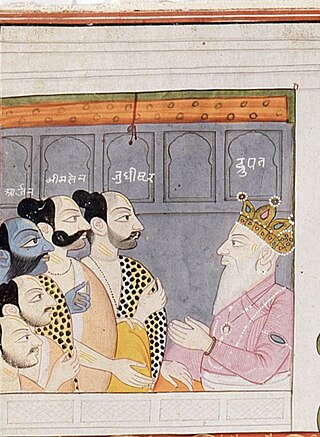
Drupada, also known as Yajnasena, is the king of the southern part of Panchala Kingdom, in the Hindu epic Mahabharata. He is the father of Draupadi, the epic's lead female character. In the Kurukshetra War as the head of 1 akshauhini army, Drupada fought from the side of his sons-in-law, the Pandavas, and was killed by his childhood friend and rival, Drona.

Madri is a princess from the Madra Kingdom mentioned in the Hindu epic, the Mahabharata. She became the second wife of Pandu, the king of the Kuru Kingdom, and was the mother of the twins Nakula and Sahadeva, the youngest of the five Pandava brothers who play a central role in the epic.
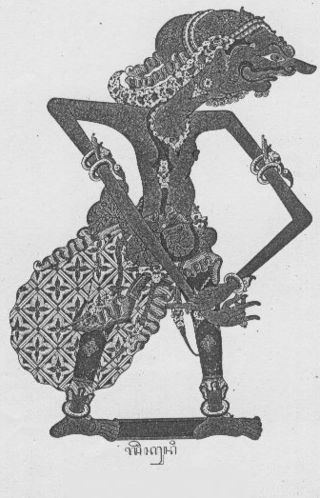
Shakuni is one of the antagonists of the Hindu epic Mahabharata. He was the prince of the kingdom of Gandhara when introduced, later becoming its king after the death of his father, Subala. He was the brother of Gandhari and the maternal uncle of the Kauravas.

Irawati Karve was an Indian sociologist, anthropologist, educationist and writer from Maharashtra, India. She was one of the students of G.S. Ghurye, founder of Indian Sociology & Sociology in India. She has been claimed to be the first female Indian Sociologist.
History of anthropology in this article refers primarily to the 18th- and 19th-century precursors of modern anthropology. The term anthropology itself, innovated as a Neo-Latin scientific word during the Renaissance, has always meant "the study of man". The topics to be included and the terminology have varied historically. At present they are more elaborate than they were during the development of anthropology. For a presentation of modern social and cultural anthropology as they have developed in Britain, France, and North America since approximately 1900, see the relevant sections under Anthropology.
Shivaji Sawant was an Indian novelist in the Marathi language. He is known as Mrutyunjaykaar for writing the famous Marathi novel - Mrutyunjay. He was the first Marathi writer to be awarded with the Moortidevi Award in 1994.

Parva (Epoch) is a novel written by S. L. Bhyrappa in the Kannada language. It is a retelling of the Sanskrit epic Mahabharata, narrated through the personal reflections of the principal characters. The novel is widely acclaimed as a modern classic. Parva is among Bhyrappa's most widely debated and popular works and is considered by many to be his greatest.
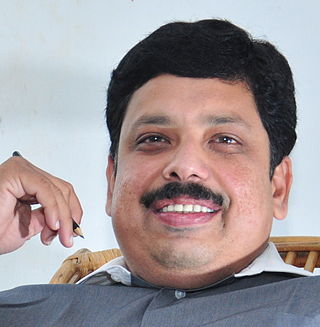
Anand Neelakantan is an Indian novelist, columnist, screenwriter, and public speaker. One of India's best selling authors, He is known for writing mythological fiction and has authored 15 books in English and one in Malayalam. He has been writing a column in The New Indian Express since 2017.
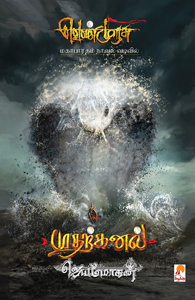
Venmurasu is a Tamil novel by writer Jeyamohan. It is a modern renarration of the Indian classical epic Mahābhārata.
Meenakshi Jain is an Indian political scientist and historian who served as an associate professor of history at Gargi College, Delhi. In 2014, she was nominated as a member of the Indian Council of Historical Research by the Government of India. In 2020, she was conferred with the Padma Shri, India's fourth highest civilian award, for her work in the field of literature and education.
Nandini Sundar is an Indian professor of sociology at the Delhi School of Economics whose research interests include political sociology, law, and inequality. She is a recipient of the Infosys Prize for Social Sciences in 2010. She was also awarded the Ester Boserup Prize for Development Research in 2016.

Ini Njan Urangatte is a Malayalam-language novel written by P. K. Balakrishnan in 1973. The novel's inspiration is the Sanskrit epic Mahabharata. It may be regarded as a historically notable Malayalam-language novel as it has become a yardstick for epic Malayalam fiction, spawning many Mahabharata based-novels.
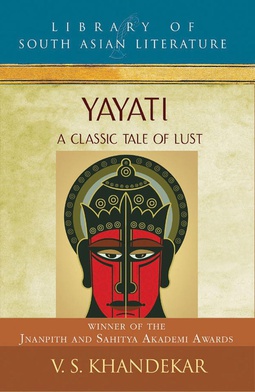
Yayati is a 1959 Marathi-language historical novel by Indian writer V. S. Khandekar. One of Khandekar's best-known works, it retells the story of the historical Hindu king, Yayati, from the Hindu epic the Mahabharata. The novel has multiple narrators, and poses several questions on the nature of morality. Scholars have analysed its hero, Yayati, as a representation of modern man. Accepted as classic of Marathi literature, Yayati has won several awards, including the Sahitya Akademi Award in 1960 and the Jnanapith Award in 1974.
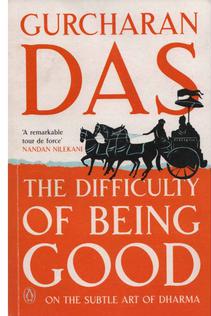
The Difficulty of Being Good: On the Subtle Art of Dharma is a book written by Indian author Gurcharan Das and published by Penguin Random House. The book is centrally focused on why to be good in our day to day, private, and public life and the essence of Dharma, a key concept in Indian philosophy for righteousness, with reference to Indian epic Mahabharata.
References
- ↑ Karve, Irawati (1 January 2006). Yuganta - End of an Epoch. Orient Longman/Disha. ISBN 8125014241.
- ↑ "Yuganta" . Retrieved 10 October 2016.
- ↑ "Three Translated Books Published". 14 October 2020.
- ↑ Sundar, Nandini (2007), "In the cause of anthropology: the life and work of Irawati Karve", in Uberoi, Patricia; Sundar, Nandini; Deshpande, Satish (eds.), Anthropology in the East: The founders of Indian Sociology and Anthropology, New Delhi: Permanent Black, ISBN 978-1-90542-277-7